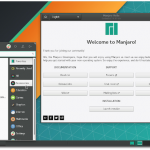Ubuntu Linux 17.10 'Artful Aardvark' Beta 2 now available to download

Fall is officially here, and while some people get excited for pumpkin spice lattes and falling leaves, other folks get excited about something far nerdier -- Ubuntu. Yes, every October a new version of the Linux-based operating system is released. This year in particular is very significant, as with Ubuntu 17.10, GNOME is replacing Unity as the default desktop environment.
Today, Beta 2 of Ubuntu Linux 17.10, code-named "Artful Aardvark," becomes available to download. This second beta is the final beta as well, which signals that the operating system is almost ready for primetime.
Samsung selects Ubuntu 16.04 as primary Linux distro for some ARTIK IoT modules

Next month, Ubuntu 17.10 will be released. Even after that release, version 16.04 will remain the most recent LTS version. If you aren't familiar, LTS stands for "Long Term Support," which quite literally means it is supported by Canonical for a longer period of time. For instance, Ubuntu 16.04 will be supported until 2021, while the newer 17.04 is only supported until 2018.
Today, Canonical announces that Samsung has selected version 16.04 LTS of the operating system as the primary Linux distro for some of the ARTIK internet of things modules. This is a smart choice by Samsung, because long support is preferable to bleeding edge for an IoT device.
System76 Pop!_OS Beta Ubuntu-based Linux distribution now available to download

Next month, a new era of Ubuntu begins. Unity is dead, and GNOME 3 takes over as the default desktop environment. While this change was for the best, it was still shocking for many. For a company like System76, for instance, that sells computers pre-loaded with Ubuntu, this was problematic. Why? Well, the company essentially lost control of the overall user experience by relying on vanilla Ubuntu. It was being forced to follow Canonical's path.
To solve this, and regain some control, System76 has been developing its own operating system called "Pop!_OS." No, it is not reinventing the wheel here -- it will still use Ubuntu as a base, and GNOME will be the desktop environment. The company is customizing the operating system, however, with things like fonts, themes, and icons, to create something truly unique. This could lead to an improved user experience. Today, the first official beta of the operating system becomes available for download.
Download latest Linux-based LibreELEC Krypton -- Kodi addons like Exodus and Covenant will work

The Kodi media center is facing a lot of scrutiny in the media lately. Some people feel that the negative coverage is "fake news." It is important to remember that Kodi is not illegal. With that said, it can be made so with piracy-related addons. Since Kodi is open source, even if the developers removed the ability to install addons, other people could easily fork the code to add it back. Pandora's box cannot be closed.
Many people that use Kodi do so with a dedicated Linux-based operating system, such as the excellent LibreELEC. You see, these distros exist only to run the open source media center, meaning there are no resources wasted on unnecessary things. Today, LibreELEC (Krypton) v8.1.2 BETA sees release. You can install it immediately, and don't worry -- your addons like Exodus and Covenant will work fine.
Korora 26 'Bloat' Fedora-based Linux distro available for download -- now 64-bit only

Fedora is my favorite Linux distribution, but I don't always use it. Sometimes I opt for an operating system that is based on it depending on my needs at the moment. Called "Korora," it adds tweaks, repositories, codecs, and packages that aren't found in the normal Fedora operating system. As a result, Korora deviates from Red Hat's strict FOSS focus -- one of the most endearing things about Fedora. While you can add all of these things to Fedora manually, Korora can save you time by doing the work for you.
Since Korora is based on Fedora, it always lags from a version perspective. For instance, Fedora 26 was released in July, but Korora 26 is only seeing a release today. With version 26 of Korora, the big news is the fact that it is now 64-bit only -- 32-bit development for the operating system is dead. It is also the first version of the OS created with "Canvas" -- a new tool designed to simplify the process of creating the Korora operating system from Fedora.
Canonical builds a custom Ubuntu kernel for Microsoft Azure

Microsoft's relationship with Ubuntu-maker Canonical has been getting increasingly cosy over the past couple of years, and the two companies are now working even more closely with each other. The latest fruit of this partnership is a custom Azure-tailored Ubuntu kernel.
The updated kernel introduces new features including NAPI and Receive Segment Coalescing, Hyper-V socket capability, and support for Accelerated Networking in Azure. Any Ubuntu 16.04 LTS image brought up from the Azure portal after September 2 will be running on this Azure tailored Ubuntu kernel.
GNOME partners with Purism on Librem 5 Linux-based privacy-focused smartphone

The Librem 5 smartphone by Purism has a long and difficult road ahead of it. Competing against the likes of Apple and Google on the mobile market has proven to be a death sentence for many platforms -- including Microsoft with its failed Windows 10 Mobile. With that said, I am rooting for Purism and its Pure OS, as the world would benefit from a device that uses Linux and focuses on both privacy and security. Such an alternative to iPhone and Android would be a breath of fresh air.
Luckily, Purism has found itself a new partner on this project -- one of the most important organizations in the Linux community -- The GNOME Foundation. Yes, the maker of the absolute best desktop environment is offering to assist with the Librem 5 -- if it is successfully crowdfunded, that is. To date, it is only about 33-percent funded, although there is still more than a month to go.
Get 'Linux Networking Cookbook' ($17 value) FREE for a limited time
Linux Mint 18.3 Ubuntu-based operating system is named 'Sylvia'

Ubuntu 17.10 is almost here, and many Linux users are excited. Canonical's operating system is already excellent, but it will soon be even better thanks to a new default desktop environment -- GNOME. What this means for the Ubuntu-based Linux Mint's usage remains to be seen. You see, many people choose Mint because they do not like the Unity DE. Now that Ubuntu has ditched Unity, the reasons to opt for a distro based on Ubuntu rather than using "The Real McCoy" are dwindling.
But OK, if you are still a diehard Linux Mint user for some reason, I have some interesting news. Version 18.3 is coming soon, and we now know the official code name. As is typical with the Mint operating system, a woman's name is being used. This time, "Sylvia" has been selected. Besides the name, we know some other interesting tidbits -- the distro will be getting a secondary default backup tool (Timeshift), and Xreader is being significantly improved.
GNOME 3.26 'Manchester' desktop environment is here, Linux fans!

When people think of Linux-based operating systems, they often imagine people typing in a terminal or coding in a basement while drinking Mountain Dew -- yeah, those stupid old stereotypes still exist, sadly. While that is surely part of the user base, other users choose an open source operating system for nothing more than using their computer as a tool. In other words, some folks use Ubuntu, Fedora, or other distros just to get normal stuff done -- word processing, web surfing, and more. No terminal. No coding. No religious-like experiences.
For these Linux users, and others, the desktop environment sort of is the operating system. It is how they interact with their computer and launch their apps -- what's under the hood doesn't necessarily matter. For many, GNOME 3 is their preferred environment, and for good reason -- it is beautiful, intuitive, and getting better all the time. Today, GNOME 3.26 codenamed 'Manchester' sees release. It is chock full of improvements, such as a much-needed refreshed settings menu, enhanced search, and color emoji! Yes, Linux users like using the silly symbols too!
Bashware: Microsoft refutes claims that Linux makes Windows 10 insecure

A recent report from Check Point Research suggested that the presence of Windows Subsystem for Linux (WSL) in Windows 10 poses a security risk to Microsoft's operating system. Researchers from Check Point highlighted the issue of Bashware attacks which use WSL to bypass security products.
Microsoft, predictably enough, disagrees with the findings -- and so do other researchers. The Windows-maker says it views the risk of Bashware as "low". But is the company being too dismissive?
BlueBorne Bluetooth vulnerability 'exposes almost every connected device'

Armis Lab, the Internet of Things security firm, has revealed details of BlueBorne, a Bluetooth vulnerability that affects millions of iOS and Android smartphones, IoT devices, and Windows and Linux systems. In all, 5.3 billion devices are believed to be at risk.
The BlueBorne attack makes it possible for an attacker to spread malware or take control of nearby devices. What's particularly concerning is that for an attack to be successful, there is no need for device pairing, or even for a target device to be in discoverable mode. There's also no need for any sort of interaction by the victim -- everything can happen completely silently in the background.
Bashware attack makes Linux a security threat to Windows 10

While many people welcomed the arrival of Windows Subsystem for Linux (WSL) in Windows 10, it has been found to be a potential security issue. A new technique known as a Bashware has been discovered by security researchers that makes it possible for malware to use the Linux shell to bypass security software.
While administrator access is needed to execute a Bashware attack, this is fairly easily obtained, and the technique can be used to disguise malicious operations from antivirus software and other security tools. Researchers from Check Point Research point out that the danger stems from the fact that "existing security solutions are still not adapted to monitor processes of Linux executables running on Windows."
Want to switch from Windows 10 to Linux? Download Zorin OS 12.2 with Microsoft Office support

Windows 10 isn't a bad operating system, but understandably, not everyone loves it. You know what? That is OK. People have different likes and needs, and sometimes an alternative to Microsoft's operating system, such as Ubuntu, macOS, or Chrome OS can be a better fit.
If you want to switch to Linux, there is no shortage of operating systems based on the kernel. With that said, many of them aren't very user friendly. If you have lived your life using Windows, it is wise to choose a Linux distro that caters to your habits and expectations. One such operating system with a very inviting user interface is Zorin OS, and today, version 12.2 sees release. If you have been on the fence regarding Linux, now might be your time.
Manjaro Gellivara 17.0.3 Arch-based Linux distro now available -- final 32-bit release

Tomorrow is Labor Day, meaning for many of you, this is a three-day weekend. While some folks will use this time to relax, we computer geeks will instead tinker with hardware and try new software. If you like to install and play with various Linux-based operating systems, Labor Day Weekend is perfect for this!
Today, version 17.0.3 of the Manjaro Gellivara Linux distribution becomes available. This Arch-based operating system is quite the satisfying experience -- I highly recommend it. This will be the final "Gellivara" release, which also means it is the final 32-bit version of Manjaro. Yes, folks, for the next major version of the operating system, you will need 64-bit hardware to use this distro. If your hardware is still 32-bit only, please buy a new machine already!
© 1998-2025 BetaNews, Inc. All Rights Reserved. Privacy Policy - Cookie Policy.
